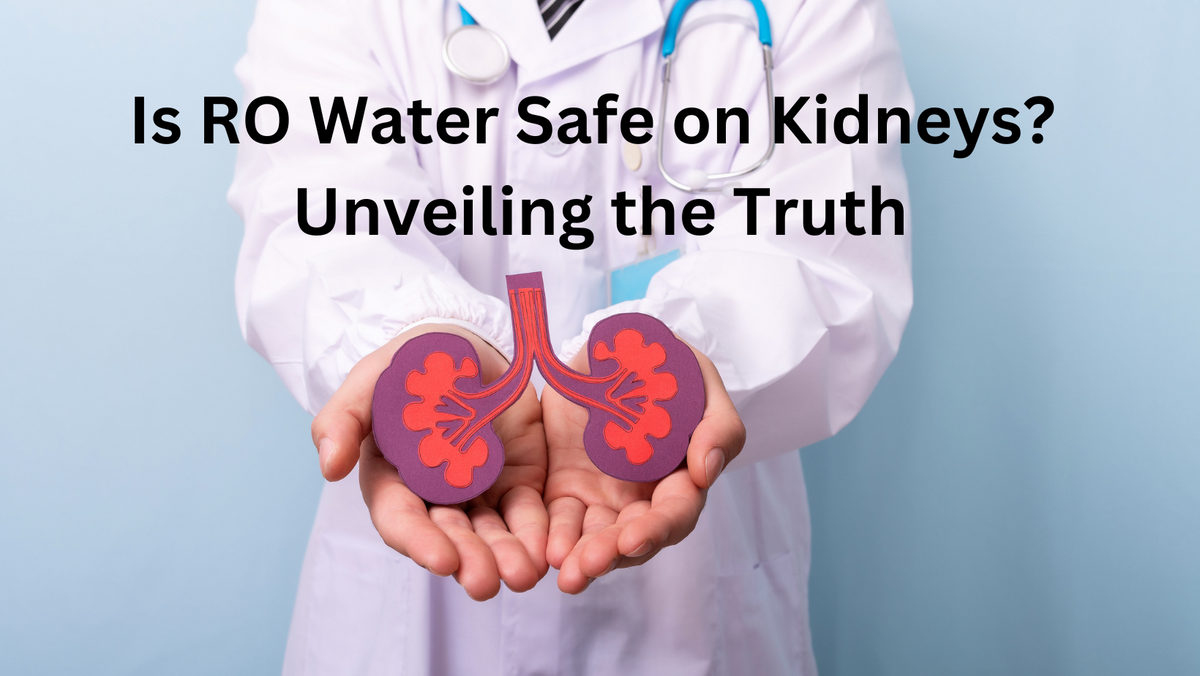Imagine taking a sip of water, the source of life, only to wonder if it’s harming your kidneys. You might be using reverse osmosis (RO) water, praised for its purity, but questions linger about its safety.
Could this crystal-clear water be silently affecting your health? Your kidneys, vital for filtering waste and balancing fluids, deserve the best care. It’s crucial to understand how RO water interacts with these essential organs. Uncover the facts and myths surrounding RO water and kidney health.
This knowledge empowers you to make informed choices for your well-being. Keep reading to discover the truth about RO water and its impact on your kidneys.
What Is Ro Water?
Have you ever wondered what RO water is and whether it could affect your kidneys? With the popularity of RO water systems, it’s crucial to understand what this water actually is. RO, or Reverse Osmosis, refers to a specific method of purifying water, removing impurities and contaminants. This process makes the water taste better and is considered safer for drinking. But could this purified water pose any risks to your health?
Reverse Osmosis Process
The reverse osmosis process is fascinating. It involves pushing water through a semipermeable membrane. This membrane filters out unwanted substances like chlorine, bacteria, and heavy metals. Imagine it as a super-fine sieve that only lets water molecules pass through, leaving behind impurities.
RO systems can significantly improve water quality. They ensure that the water you drink is clean and safe. You might have noticed that RO water tastes crisper and cleaner compared to tap water. That’s because most dissolved solids are removed during the filtration process.
Common Uses Of Ro Water
RO water isn’t just for drinking. It’s widely used in various industries and households. You might be using it in your coffee machine or humidifier without even realizing it. Many people prefer RO water for cooking, as it doesn’t alter the taste of food.
Industries such as pharmaceuticals and electronics also rely on RO water. They need ultra-pure water for manufacturing processes. Have you ever thought about how RO water could impact your everyday life? It’s everywhere, from your home to the products you use daily.
But here’s a question: could consuming RO water regularly affect your kidneys? While RO water is generally safe, it’s essential to consider its mineral content. Some argue that removing essential minerals might not be ideal for long-term health. What do you think? Could the lack of minerals be a concern?
Understanding the nuances of RO water can help you make informed decisions about your health. So, next time you sip that glass of RO water, you’ll know exactly what you’re drinking!

Credit: www.netsolwater.com
Nutrient Content In Ro Water
Reverse Osmosis (RO) water is popular for its purity. It effectively removes contaminants and impurities. But this process also affects the water’s nutrient content. Essential minerals like calcium and magnesium can be stripped away. This raises questions about its health benefits and potential drawbacks.
Mineral Removal
RO systems are efficient at removing unwanted substances. They also remove beneficial minerals. Calcium, magnesium, and potassium are often lost. These minerals are crucial for health. Their absence can impact bodily functions. This is particularly concerning for people with specific health needs.
Comparing With Other Water Types
Tap water usually contains various minerals. These contribute to daily nutritional intake. Spring water naturally holds a balance of minerals. Mineral water is enriched with extra nutrients. In contrast, RO water lacks these natural minerals. It offers purity but not nutrient richness. This can affect those relying on water for mineral intake.
Health Implications Of Ro Water
Reverse Osmosis (RO) water has become a popular choice for many households. It’s celebrated for its ability to remove impurities and provide clean drinking water. But what are the health implications of consuming RO water?
Is it always beneficial, or could there be hidden concerns?
Impact On Hydration
RO water is stripped of impurities, but it also loses essential minerals. These minerals, like calcium and magnesium, play a crucial role in hydration. When you drink mineral-free water, your body might not absorb the water as effectively.
Have you ever wondered why you still feel thirsty after drinking several glasses? It could be because your body isn’t getting the minerals it needs to retain water. This can leave you feeling less hydrated, despite drinking ample amounts.
Potential Nutrient Deficiency
RO water, while pure, can lead to nutrient deficiencies over time. Essential minerals are not only crucial for hydration but also for maintaining overall health. Drinking RO water exclusively might mean you’re missing out on these nutrients.
Consider the impact of missing out on magnesium, which supports muscle and nerve function, or calcium, vital for bones. Could this be affecting your health in ways you haven’t considered?
When I switched to RO water, I noticed feeling more fatigued. It wasn’t until I learned about the potential nutrient deficiencies that I realized the connection. Are you feeling similar effects?
Perhaps it’s time to balance the purity of RO water with the nutrients your body needs. Could adding a mineral supplement or incorporating mineral-rich foods help?
What steps will you take to ensure your water is both pure and nourishing?

Credit: www.alfaauv.com
Kidney Function And Water Intake
Concerns about RO water affecting kidney function have emerged. RO water lacks essential minerals, potentially impacting hydration balance. Proper mineral intake supports healthy kidney filtration and prevents potential issues.
Understanding the relationship between kidney function and water intake is essential for maintaining optimal health. Our kidneys, the body’s natural filtration system, require adequate water to efficiently remove waste and toxins. But can drinking RO (Reverse Osmosis) water, known for its purity, affect kidney health negatively?Role Of Water In Kidney Health
Water is crucial for kidney health. It helps dissolve minerals and nutrients, making them accessible to the body. Proper hydration ensures that the kidneys filter blood effectively, maintaining electrolyte balance and removing waste. Imagine a time you felt dehydrated after a workout. You likely experienced fatigue or a headache. Dehydration puts stress on your kidneys, making them work harder. Drinking enough water helps avoid this strain.Factors Affecting Kidney Function
Several factors can influence kidney function. High blood pressure and diabetes are well-known risks. But did you know that your water choice might also play a role? Drinking RO water is often debated. Some argue it lacks essential minerals like calcium and magnesium, which could theoretically impact kidney health. Consider your diet and lifestyle. Are you consuming enough nutrients from other sources? If your diet is balanced, the lack of minerals in RO water may not be a significant concern. Have you ever thought about how much water you drink daily? Both insufficient and excessive water intake can affect kidney function. It’s crucial to find a balance that supports your body’s needs. By understanding these factors, you can make informed decisions about your water intake and its impact on your kidneys. What changes will you make to support your kidney health today?Studies On Ro Water And Kidney Health
Concerns about RO (Reverse Osmosis) water affecting kidney health are common. RO water is known for its purity. It removes impurities and contaminants effectively. But does it impact kidney health? Various studies aim to answer this. Understanding these studies helps clarify any potential risks. Below, we explore the research and expert opinions.
Research Findings
Several studies examine the effects of RO water on kidneys. Most focus on mineral content. RO water lacks minerals like calcium and magnesium. Some researchers believe this might affect kidney function. However, there isn’t a consensus yet. Some studies suggest no significant impact. The results remain mixed. More research is needed to draw clear conclusions.
Expert Opinions
Experts have varied views on RO water and kidney health. Some caution against long-term consumption due to mineral loss. They suggest supplementing minerals if drinking RO water regularly. Others argue that a balanced diet compensates for this loss. They emphasize that kidneys handle filtered water well. The key is maintaining overall health. Drinking RO water in moderation, along with a nutritious diet, is often recommended.
Myths And Facts
Many believe RO water might harm kidneys, but this is largely a myth. Properly filtered water is safe for consumption, as it removes impurities without affecting kidney health. Scientific studies support its safety, dispelling common misconceptions.
Drinking reverse osmosis (RO) water has become increasingly popular, but it has also sparked debates and concerns. One question that often arises is whether RO water can cause kidney problems. It’s essential to separate myths from facts to make informed decisions about your health. Let’s dive into common misconceptions and look at the scientific evidence surrounding this topic.Common Misconceptions
Many people believe that because RO water is stripped of minerals, it may lead to kidney issues. You might have heard claims that the lack of minerals can cause the body to leach nutrients from your bones and organs, including the kidneys. However, it’s crucial to understand that drinking water is not a primary source of your daily mineral intake. You get most of your minerals from food. So, the idea that RO water can cause kidney problems due to mineral deficiency is a myth.Scientific Evidence
What does science say about RO water and kidney health? Studies show that RO water is safe for consumption. The World Health Organization (WHO) has conducted research on low-mineral water and found no evidence linking it to kidney damage. If you have existing kidney issues, your doctor may advise you on the right type of water to drink. But for the general population, RO water poses no risk. Are you still worried about mineral loss? Consider adding mineral-rich foods to your diet. This way, you can enjoy the purity of RO water while ensuring adequate mineral intake. Ask yourself: Are myths influencing your water choices? It’s easy to get swayed by misconceptions. But understanding the facts can lead you to healthier decisions.Safe Water Consumption Tips
Concerns about RO water and kidney problems arise due to mineral removal. Drinking RO water can lack essential minerals. Balancing RO with mineral-rich water can help maintain health and ensure safe consumption.
When it comes to ensuring the water you drink is safe and healthy, the devil is in the details. You might be wondering whether RO (Reverse Osmosis) water can cause kidney problems. The answer isn’t straightforward and depends largely on how you consume it. Let’s explore some safe water consumption tips to maintain your health and well-being.Ensuring Nutrient Balance
Drinking RO water alone might leave you lacking essential minerals like calcium and magnesium. This can affect your body’s nutrient balance. To counteract this, make sure your diet includes a variety of mineral-rich foods. Consider adding foods like leafy greens, nuts, and seeds to your daily meals. These not only help maintain your nutrient levels but also provide other health benefits. If you feel your diet might not be enough, consult a healthcare professional about supplement options.Choosing The Right Water Source
Not all water sources are created equal. RO water is an excellent option for removing impurities. However, it might not be suitable for everyone due to its lack of minerals. Think about your personal health needs. If you have specific concerns, like kidney issues, discuss your water choices with a healthcare provider. They can help determine if RO water is a good fit for you, or if another type of water would be better. Remember, your body’s needs are unique. What works for one person might not work for another. It’s important to assess your lifestyle and health to make the best decision for you. Drinking water is not just about quenching thirst. It’s about nourishing your body too. Make informed choices to keep your kidneys and overall health in check.
Credit: nuaquasystems.com
Frequently Asked Questions
Is Ro Water Bad For Kidneys?
RO water is generally safe for kidneys. It removes impurities and contaminants. However, it also removes essential minerals. Consider supplementing minerals if your diet lacks them. Consult a healthcare professional for personalized advice.
Can Ro Water Cause Mineral Deficiency?
RO water removes minerals like calcium and magnesium. If your diet lacks these, mineral deficiency may occur. Consume a balanced diet to compensate. It is important to monitor your mineral intake and consult a nutritionist.
Does Ro Water Affect Kidney Health?
RO water is typically safe for kidney health. It removes harmful substances, preventing kidney strain. However, it lacks minerals. Ensure mineral intake through food or supplements. Consult a doctor for tailored guidance.
Should I Worry About Ro Water?
Generally, there’s no need to worry about RO water. It effectively filters impurities, ensuring safe drinking water. However, it lacks essential minerals. Maintain a balanced diet to compensate for these lost nutrients. If concerned, consult with a healthcare expert.
Conclusion
Drinking RO water is generally safe for most people. Concerns about kidney problems remain unproven. Stay informed and consult health professionals for personalized advice. Balance is key in any diet. Include minerals from other sources if needed. Listen to your body.
If you notice unusual symptoms, seek medical guidance promptly. Making informed choices is essential. Your health should be your top priority. Remember, a balanced lifestyle supports overall well-being. Keep researching and stay updated on health topics.

Hasan Al Sarker is a Reverse Osmosis Specialist. He has worked for many years to ensure safe drinking water for all. His research paper has been published in several journals, including Issue, Medium, and Slideshare. He is recognized as a water doctor among specialists though he did not attend medical college.
Besides working as a researcher of reverse osmosis technology, he is also very fancy with the kitchen and cooking. His guides are reading thousands of people every day. As a head of content, he is responsible for all the published articles at RO System Reviews.

